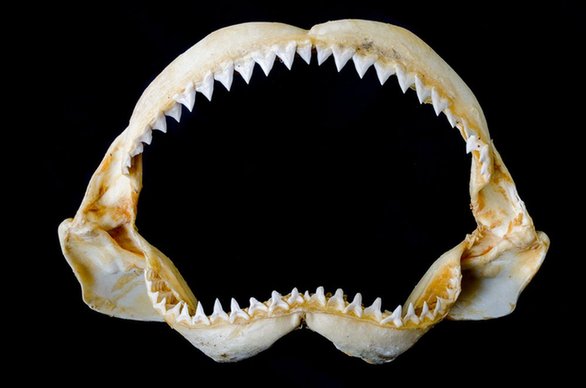(单词翻译:单击)
Good news for soda lovers: Scientists appear to be one step closer to being able to regenerate teeth in humans. A study in Developmental Biology explains how sharks and other marine life are able to regrow teeth continuously throughout their lives.
告诉碳酸饮料爱好者一个好消息:科学家向人类牙齿再生技术又迈进了一步。《发育生物学》上刊登了一项研究,向我们解释了鲨鱼及其它海洋生物可以终生不断再生牙齿的原理。
Until now, that process had been "poorly understood and [remained] virtually uncharacterized from a developmental genetic standpoint." Researchers at the University of Sheffield studying the embryos of catsharks discovered a "special set of epithelial cells" called dental lamina that are responsible for regenerating teeth, according to a press release.
人们此前对鲨鱼牙齿的再生过程“了解甚少”,认为它“一直是发育遗传理论中的特例”。据报道,英国谢菲尔德大学负责猫鲨胚胎研究的学者发现了一种名为牙板的“特殊上皮细胞群”,它能再次发育出牙齿。

Those genes goes back 450 million years and are likely responsible for producing the first teeth in vertebrates, as well as generating all the teeth since, including those in humans. In fact, humans have the same dental lamina, but they produce teeth only twice ("baby" teeth, then the adult versions) before the cells disappear. Researchers believe it's possible for this research to eventually help people who've lost teeth.
这种基因的存在可以追溯到4.5亿年前,可能正是因为它,脊椎动物(包括人类)才长出了第一批牙齿,以及之后的所有牙齿。事实上,人类也有相同的牙板,但人类的牙板在牙齿发育完两次(即乳牙和恒牙)之后,就消失了。研究人员认为,这项研究很有可能最终会帮助缺牙患者重新拥有牙齿。
"The Jaws films taught us that it's not always safe to go into the water, but this study shows that perhaps we need to in order to develop therapies that might help humans with tooth loss," says researcher Dr. Gareth Fraser.
研究人员加雷斯·弗雷泽博士说:“《大白鲨》这部电影告诉我们,人类进入海里可能遭遇危险。但我们的研究表明,为了帮缺牙患者找到修复方法,或许我们还是有必要入海(研究海洋生物)。”


